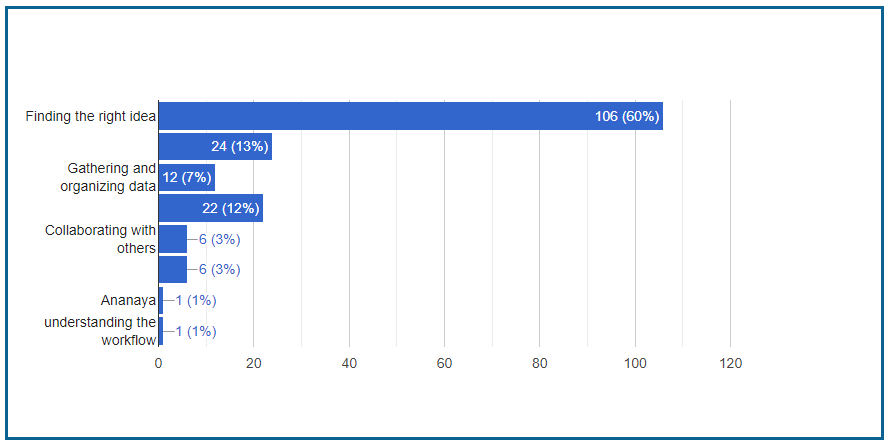
Commerce is changing quickly, and keeping up with these changes is important. As we move into 2024, there are new trends and technologies shaking things up. Research helps us understand these changes and find smart ways to deal with them.
In this article, we’re sharing the Top 100 Research Topics in Commerce Field in 2024. This list covers the most interesting and important subjects right now, from how artificial intelligence is changing online shopping to the big ethical questions companies are facing.
Whether you’re a researcher looking for new ideas, a business leader wanting to stay ahead, or a student interested in current issues in commerce, this guide is for you. Explore these top 100 topics to get a clear view of what’s happening and make a difference in the field of commerce.
Survey Results: Challenges in Choosing the Right Project Idea

We recently polled 178 people and noticed that many struggled to select the best project idea. The majority of participants said they needed help choosing a project.
Why Research Topics Matter in Commerce Field?
Research topics in commerce are really important for a few key reasons:
- Keeping Up with Trends: Research helps businesses understand what’s changing in the market and what customers want. This lets companies adjust their plans and stay competitive.
- Fostering Innovation: Looking into new research can spark new ideas and innovations. This means businesses can come up with fresh products and services that meet new needs.
- Making Smart Choices: Having the latest research gives businesses the data they need to make better decisions. This helps avoid risks and boosts the chances of success.
- Finding New Opportunities: Research can reveal new areas for growth. By spotting trends early, businesses can jump on new opportunities before they become widely known.
- Boosting Efficiency: Research shows the latest methods and tools, helping businesses operate more efficiently and save money.
- Solving Problems: Research provides practical solutions to help businesses cope with challenges such as changes in regulations or economic shifts.
- Improving Customer Experience: Understanding consumer behavior through research allows businesses to tailor their offerings to meet customer needs better, leading to happier customers.
- Shaping Industry Rules: Research also helps influence policies and industry standards by providing important insights.
In short, research topics in commerce are key to staying updated, driving innovation, making informed decisions, and solving problems. They help businesses succeed in a constantly changing world.
Top 100 Research Topics In Commerce For 2024
Here are the Top Research Topics In Commerce For 2024
- How AI is Changing Customer Service in Retail
- Using Blockchain to Make Supply Chains More Transparent
- Challenges and Solutions for Sustainable E-Commerce
- Why Subscription-Based Business Models are Growing
- Keeping Consumer Privacy Safe in the Age of Big Data
- What’s Next for Digital Payment Systems
- How Augmented Reality is Making Online Shopping Better
- The Impact of Social Media Ads on What We Buy
- How FinTech is Helping More People Access Financial Services
- The Economic Effects of Cryptocurrencies on Emerging Markets
- AI’s Role in Managing Inventory More Effectively
- Ethical Concerns Around AI in Financial Services
- The Influence of Crowdfunding on Startup Success
- How Remote Work is Changing Company Culture
- The Effect of 5G on Mobile Commerce
- What’s New in Digital Marketing and SEO
- Regulating Cross-Border E-Commerce: What’s at Stake
- Using IoT to Build Smarter Supply Chains
- Corporate Social Responsibility in Today’s Digital World
- How Consumer Behavior is Shifting After the Pandemic
- Blockchain for Better Contract Management
- The Growth of Mobile Wallets and Digital Banking
- How Sustainable Investing is Changing Financial Markets
- Using Gamification to Boost E-Commerce Engagement
- How Data Analytics is Personalizing Customer Experiences
- Climate Change’s Impact on Global Trade and Supply Chains
- How Traditional Retail is Adapting to Digital Transformation
- Trends in Omnichannel Retailing
- AI’s Influence on Market Research
- The Rise of Ethical Consumerism and Its Business Impact
- How Augmented Reality is Enhancing Product Visualization
- Blockchain’s Role in Preventing Financial Fraud
- Challenges of Remote Work and Productivity
- Sustainable Packaging Trends in E-Commerce
- How Big Data is Shaping Financial Strategies
- Challenges in Regulating Digital Currencies
- The Future of Physical Stores in a Digital World
- Post-Pandemic Trends in Travel and Leisure
- AI’s Effect on Retail Inventory Management
- Opportunities and Challenges in the Gig Economy
- Enhancing Supply Chain Resilience with Technology
- Trends in Automated Customer Service
- How Data Privacy Regulations Affect Global Commerce
- Digital Platforms Helping Small Businesses Grow
- Sustainable Practices in Corporate Supply Chains
- How Virtual Reality is Boosting Consumer Engagement
- Corporate Governance and Ethics in the Digital Era
- The Rise of Direct-to-Consumer Business Models
- Economic Impacts of New Payment Technologies
- Building Brand Loyalty in the Digital Age
- How AI is Changing Human Resource Management
- Using Predictive Analytics for Better Financial Forecasting
- E-Commerce Trends After COVID-19
- Challenges and Opportunities in International E-Commerce
- Blockchain for Enforcing Contracts
- How Consumers View Sustainable Business Practices
- Innovations in Payment Security
- Data Analytics and Its Impact on Marketing ROI
- Managing Global Supply Chain Disruptions
- How Digital Advertising is Evolving
- Mobile Apps for Improving Customer Loyalty
- Ethical Issues in AI-Driven Marketing
- The Impact of 5G on Mobile Payments
- Blockchain’s Role in Trade Transparency
- How Consumers View AI in Retail
- Social Media’s Impact on Brand Image
- The Growth of Digital Nomadism and Its Business Effects
- How Automation is Affecting Job Markets
- AI and Machine Learning in Financial Planning
- Sustainable Business Models in the Fashion Industry
- Future Trends in Digital Banking and FinTech
- Improving Customer Experience on E-Commerce Platforms
- Remote Work’s Effects on Urban Economies
- Blockchain for Protecting Intellectual Property
- Strategies for Digital Transformation in Retail
- Ethical Concerns in Digital Data Collection
- How Big Data Influences Financial Markets
- Advances in Customer Relationship Management
- Sustainable Practices in Supply Chains
- AI in Personalized Marketing
- Digital Asset Management and Cryptocurrency Trends
- Regulating the Global Digital Economy
- Consumer Privacy and Security in Online Transactions
- AI’s Role in Managing Financial Risk
- Trends in Cross-Border E-Commerce Logistics
- Digital Innovations in Real Estate Management
- Using Data Analytics to Boost Customer Satisfaction
- Blockchain for Better Business Contract Management
- The Future of Automated Financial Advisory Services
- Challenges in Regulating Digital Payment Systems
- Supporting Small Businesses with Digital Platforms
- Impact of Emerging Technologies on Global Trade
- Digital Currency Trends and Their Effect on Traditional Banking
- How Technology is Shaping Customer Service Expectations
- Adapting to Fast Changes in E-Commerce
- AI’s Role in Optimizing Supply Chains
- Consumer Behavior in the Digital Age
- Blockchain for Transparency in Business
- Future Trends in Digital Marketing
- Technological Advances and Financial Regulations
What You Need to Know Before Starting Research in the Commerce Field
- Define Your Purpose
- Know why you’re doing the research: It’s important to be clear on the reason behind your study. Are you aiming to solve a particular problem, provide business insights, or complete an academic project? Knowing your purpose will help guide your entire process.
- Ask the right questions: Before you start, have specific questions in mind that you want to answer. This will keep you focused and on track.
- Build a Solid Understanding of Commerce
- Know the basics: Make sure you understand the main areas of commerce, such as economics, marketing, finance, and business law. These are the building blocks for your research.
- Stay updated on trends: Research in commerce moves quickly, so it’s important to be aware of the latest developments—whether it’s e-commerce, digital marketing, or emerging financial technologies like FinTech.
- Review What’s Already Out There
- Look at existing research: Before diving in, review what others have written on your topic. This will give you a sense of what’s already been covered and help you identify any gaps where your research can add value.
- Understand key theories: Familiarize yourself with any relevant theories or models. These will help guide your approach and give structure to your work.
- Ensure Access to Data
- Find reliable data: Good research is built on solid data. Make sure you can access credible sources, whether it’s market reports, financial data, or consumer insights.
- Decide on data collection methods: Will you be gathering your data through surveys and interviews, or will you be relying on existing studies? Be clear about how you’ll collect and analyze the data you need.
- Know Your Research Tools and Methods
- Choose the right approach: Be comfortable with the research methods you’ll be using, whether it’s qualitative, quantitative, or a mix of both.
- Get familiar with analysis tools: Depending on your data, you may need to use tools like Excel, SPSS, or other statistical software to make sense of the information you gather.
- Pick a Relevant, Focused Topic
- Stay current: Make sure your research topic is relevant to current trends in commerce, whether that’s sustainability, digital transformation, or new technologies like blockchain.
- Keep it specific: Choose a topic that’s narrow enough to be manageable but still broad enough to give you room for meaningful insights.
- Think About Ethics
- Follow ethical guidelines: If your research involves people (like surveys or interviews) or sensitive information, make sure you follow ethical standards.
- Avoid plagiarism: Always give credit where it’s due. Make sure your work is original by properly citing any sources you use.
- Plan Your Time and Resources
- Manage your time well: Research can be time-consuming, so break your project into stages (like reading up on the topic, collecting data, analyzing results, and writing) and give yourself deadlines for each part.
- Ensure you have the right resources: If you need specific tools, data access, or money for surveys, plan for that ahead of time to avoid delays.
- Get Feedback
- Talk to experts: It’s always a good idea to get feedback from people who are experienced in your area of research. This could be a professor, industry professional, or even a colleague.
- Share your plans: Before you dive into the full project, consider sharing your research plan with peers or mentors to get their input and make sure you’re on the right track.
By covering these basics, you’ll have a strong foundation for your research and be better prepared to tackle your topic in the commerce field.
Final Words
Looking into the Top 100 Research Topics in Commerce Field in 2024 is a great way to explore what’s happening in business right now. These topics cover important areas like new technologies, global trade, and sustainability.
By choosing one of these topics, you’ll be working on issues that are very relevant today. Whether you’re studying how new digital tools affect business or looking at the impact of trade rules, your research can provide useful information and help shape the future.
FAQs
What should I consider when researching these topics?
Key factors include staying current with industry trends, using reliable data, choosing the right research methods, and considering ethical considerations.
How can my research make a difference in the commerce field?
Your research can offer new insights, influence business practices, guide policy decisions, and contribute to academic knowledge. By tackling these important topics, you help advance understanding and drive progress in commerce.
Are there specific methods I should use for these topics?
The best method depends on your topic and goals. Common procedures include qualitative approaches (like interviews and case studies), quantitative approaches (such as surveys and data analysis), or a mix of both. Choose the strategy that best fits your research.



